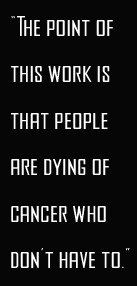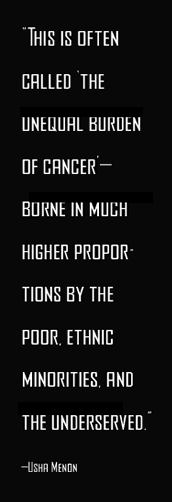| Vol.
13. No. 1 |
Summer
2003 |
 |
 ...... ...... Usha Menon shown with co-investigator Peter Maramaldi |
 |
Fear of the unknown:
it can disrupt our lives and livelihoods, yet it often defies reason,
making it difficult to resolve in any methodical way. And among the biggest,
and scariest, unknowns is whether we have — or are predisposed to
— cancer.
One way to get around the fear that keeps so many people from undergoing
screening for cancer is to identify cancer’s causes. Scientists
worldwide are focused on figuring out what makes cancerous cells replicate.
They are piecing together genetic causes of some cancers, which has dramatically
improved early detection of the disease. And the strides that have been
made in treatments are remarkable.
That’s one form of basic scientific research — the kind for
which the University of Utah is already known. Endowed by national and
foundation grants, Usha Menon, assistant professor of nursing, and Peter
Maramaldi, assistant professor of social work, are on the leading edge
of a different tact, pursuing the radical notion that we need to know
how basic human nature affects cancer screening behavior. They are driven
to learn how people’s beliefs about disease affect their actions.
It’s called behavioral oncology — and at its heart are researchers
who know that cancer screening saves money and saves lives.
“The point of this work is that people are dying of cancer who don’t have to,” Maramaldi explains.
For example,
says Menon, “the incidence of breast cancer is lower among African
Americans than Caucasians — 120.7 vs. 137.0 per 100,000 people.
However, the mortality rate remains much higher for African American women
— 37.3 vs. 29.3. There is general agreement that this difference
in mortality is due to lower screening rates and later-stage diagnosis,”
she says.
“For colorectal cancer, the mortality rate remains higher for African
Americans, poor people, and those medically underserved,” she adds.
“This is often called ‘the unequal burden of cancer ’—
borne in much higher proportions by the poor, ethnic minorities, and the
underserved.”
 |
So how to address
those disparities and improve screening rates? For one, Menon and Maramaldi
have written a script
for counselors to use to tailor their colorectal screening pitches to
people age 50 and older, depending on their subjects’ beliefs and
behavior. Offering statistics, explaining risk factors, breaking down
the screening process into manageable steps, acknowledging fears, and
encouraging action can all be parts of a telephone counseling session.
The dialogue is customized depending on cues from the participant; words
like “fear,” “worry,” and “embarrass”
trigger different responses. For instance, if a woman mentions that she
is too self-conscious to undergo a colonoscopic examination, a trained
intervention counselor addresses that concern: “I understand that
the tests can be somewhat embarrassing for some women, but remember that
the doctor will give you medication that will put you to sleep. Most women
do not even remember the test when they wake up.”
A counselor will also focus on enhancing a participant’s confidence
in her ability to have the test. “Women just like you get these
tests done every day,” the counselor might say. “They take
responsibility for their health, and remember their families and loved
ones.”
Co-investigators
Menon and Maramaldi are analyzing how different cultural and ethnic groups
respond to such “tailored messages,” in which responses are
keyed to beliefs, as compared to “motivational interviewing.”
In the latter method, counselors might ask subjects to rate on a zero-to-12-point
scale how motivated they are to undergo screening. Using active listening
techniques—repeating what they hear and expressing empathy —
professionals reiterate self-motivational statements: “I heard you
say that you know this is something you should do, and want to do, to
protect yourself. So you feel pretty motivated to do this?” Maramaldi
and Menon will analyze the responses such motivational interviewing elicits
— including the risk of reinforcing a subject’s ambivalence.
Professing, “We will respect whatever decision you make,”
might imply permission to give in to the fear and resistance to being
tested.
Menon and Maramaldi’s study will involve researchers and participants
from Nashville, Tenn., and from Salt Lake City, providing information
on how selected African Americans respond to messages about cancer screening
colonoscopy, which is what physicians use to check for polyps or lesions
in the lower bowels. At the U, co-investigators include Stephanie Wahab,
assistant professor of social work, and Susan Terry, M.D., in the School
of Medicine.
Studying health treatments in cultural groups is familiar ground for both Menon and Maramaldi. Menon, whose master’s and doctorate are from Indiana University, is currently studying culturally appropriate breast health services for Amish and Mennonite women. The research required permission from the Amish bishops to canvass community beliefs, attitudes, and knowledge about a different type of cancer. Menon’s goal is to survey 1,200 Ohio Amish women and deliver culturally competent educational sessions in the Amish community. The study, funded by the Susan G. Komen Foundation, “was a natural extension of the pilot work conducted by some of my colleagues in the region,”says Menon.
Additionally, the Huntsman Cancer Institute is funding Menon to conduct focus groups among older whites and Hispanics in Salt Lake City to identify common barriers to colorectal cancer screening.
Maramaldi, a lifelong New Yorker with social work, public health, and Ph.D. degrees from Columbia University, joined the social work faculty in 2001 and serves as associate director for research for the W.D. Goodwill Initiatives on Aging. He was named a Hartford Geriatric Social Work Faculty Scholar in 2002.
The national award has enabled him to conduct an exploratory study into health beliefs and cultural factors contributing to behaviors related to colorectal cancer (CRC) incidence and mortality disparities among African American and Caucasian populations in the United States. “The study will allow survivors of CRC to describe their experiences with the diagnosis and treatment of their own disease, make suggestions for improving the experience for others, and explain why they think people would delay seeking screening—either follow-up for survivors or regular screening for the general population,” Maramaldi says. He hopes the study will aid in the development of standardized measures of health beliefs and inform future intervention research aimed at decreasing CRC disparities among these groups.
In addition to providing the $100,000 seed money for research during the two-year grant period, the Hartford Scholar award is a career development program designed to position him to emerge as an academic leader, role model, and mentor for future generations of social work professionals working in geriatrics. “Older people carry a greater cancer burden than the young,” Maramaldi says. “As people survive cancer, we have to understand how to enhance survivorship and maintain their quality of life. This includes their caretakers, as well.”
Maramaldi points out that the connections he and Menon have been encouraged to forge—exploring ideas about cancer screening between academic disciplines—are still quite rare. “Jannah Mather, our dean [of social work], has bent over backwards to accommodate my collaboration with Usha,” he says. “Amanda Barusch and Bill Farley BS’58 MSW’59 PhD’68 [both professors of social work] have supported my cancer research in the W.D. Goodwill Initiatives on Aging since the day I arrived here.” Likewise, says Menon, Maureen Keefe, the dean of the College of Nursing, and Susan Beck PhD’88, the associate dean for nursing research, have been extremely helpful. Maramaldi and Menon agree that this type of support from deans and senior professors is key to their continued success. And both say they would not have come to Utah had it not been for the Huntsman Cancer Institute, which has an outstanding reputation throughout the United States.
To learn how the different methods of encouraging cancer screening are received by ethnic and racial minority group members, Maramaldi and Menon are working with medically underserved people without adequate access to preventive medical care services. “This work doesn’t exclude majority populations,” Menon, the breast cancer study’s principal investigator, explains. “We’re just trying to catch folks early on and to see how much culture is a factor. My biggest reward is when a woman calls to indicate that her cancer was detected early because our study encouraged her to get a screening test.”
The staff and physicians of the community clinics operated by the U’s Department of Family and Preventive Medicine support integrating such behavioral research with primary care. The community medical clinics at University Hospital and in Midvale already offer CRC screening, a service normally found only in specialty clinics. The staff has added electronic cancer screening reminders to patients’ computerized medical records to encourage doctors to recommend it. They hope to diminish the gap between racial and ethnic minorities and whites for surviving cancer.
The clinics do not record information on race and ethnicity because patients are reluctant to divulge such information. However, based on the ethnic breakdown of the area surrounding the U’s Redwood- and Midvale-area clinics, the researchers estimate that the percentages of minority patients are 14.5 percent Hispanic, 2.4 percent Asian, 1.2 percent African American, 1.2 percent Native American, and 1.1 percent Pacific Islander.
Maramaldi and Menon will also develop and test an educational kiosk with a computerized touch-screen to engage people waiting in the U’s medical clinics with questions and answers about cancer screening. The kiosks will also use messages keyed to users’ beliefs.
Together with
Menon and Maramaldi’s ongoing studies, these community-based programs
are bringing together people on campus and across the country to understand
and meet the needs — and fears — of an aging society.
—Anne Palmer Peterson MPA’00 leads and administers professional
development programs for University of Utah Career and Organization Education
continuing education. She is former editor of Continuum.
